By Don A. Wright
The State Water Resources Control Board met at the Cal EPA Building in Sacramento on Tuesday, April 16, 2024 and online. This is actually a two day meeting but the first day is focused on the Tulare Lake Subbasin probationary hearing. Board Chairman Joaquin Esquivel called the meeting to order at 9:00am. The first item on the agenda was the public forum. That was scheduled up front at 9:00am and the hearing was scheduled to begin at 9:30am. These comments were limited to five minutes.
There is a draft resolution linked to the hearing and the board will vote on whether or not to place the Tulare Lake Subbasin (TLS) into probationary status at the end of the meeting. TLS is located primarily in Kings County.
The matter that triggers probation is whether or not the State Board finds the TLS’s Groundwater Sustainability Plan (GSP) adequate or not. Under the Sustainable Groundwater Management Act certain hydrologic subbasins have to prepare a GSP that shows how the subbasin will avoid six undesirable groundwater conditions in its aquifer by 2040. State Board staff maintains the GSP isn’t complete. The GSAs in the subbasin say they have yet another revision to the GSP and are asking the Board to delay placing the TLS in probation, until they can submit the latest version. This hearing includes lots of public and staff comments, board questions and procedural process. The meeting lasted a little over nine-hours.
Public Forum
The first speaker was Kings County Supervisor Doug Verboon who summed it up, “Increase the flow of surface water to the San Joaquin Valley.”
Verboon continued, saying two big farmers have the majority of the land and groundwater in the Tulare Subbasin. He said the El Rico Groundwater Sustainability Agency (GSA) is challenging Kings County groundwater policies.
It got a bit dizzy for moment when REACT Alliance’s Nicole Dorf told the board she was upset that sea otters haven’t been listed as off limits during the upcoming survey of Morro Bay, if I understood. That subject is on tomorrow’s agenda. Andrea Lue was also with REACT and she’s concerned about an offshore wind project’s impact on wildlife. Another lady dressed like a biker with multiple patches on her vest read a letter into the record about misconduct concerning Morro Bay. There wasn’t enough tribal outreach.
Mary Woods said she doesn’t have potable water access. She said she’s paid $80,000 on attorney fees about water charges not being fairly imposed.
Thomas Marihart, Kings County grower and ag businessman asked how the actions involving reducing groundwater pumping doesn’t violate the constitution’s Fifth Amendment taking clause.
Other speakers commenting on the Tulare Lake Subbasin agreed to hold off until the TLS hearing started. The board approved the minutes from the last meeting and the hearing began.
The Probation Hearing
At 9:30am Esquivel started the hearing and there was a good deal of housekeeping such as Spanish interpretation and how to speak on Zoom.
Esquivel said this is the first meeting of its kind and the board won’t be taking things lightly. Whether or not the board decides to place the subbasin in probation it recognizes the tremendous amount of work the local GSAs have already completed. If the board decides probation there could be pumping restrictions and reporting. Fees will be charged. This could go on for a long time or just be a temporary step.
Esquivel asked for an orderly meeting and to limit the comments to five minutes and be respectful. I know I’ve made this point before and I certainly don’t want to look like a kiss up, but Esquivel is unfailingly polite and he does run a clean meeting. Good for him.
Public Comment
Elected officials and tribes were invited to speak first. A spokesman for Assemblyman Devin Mathis said famine isn’t a far off threat if you don’t provide crops with water. Nobody knows the groundwater better than the local farmers. He urged the Board to consider the economic and food supply impacts when making its decision.
Supervisor Verboon was asked to further comment. He said county staff was told at one GSA meeting she was lucky to be allowed in the room. On another occasion, three members of a quorum attending a meeting by phone hung up when they realized there were county officials at the meeting. He also said one of the small communities were offered help with their water supplies and they declined all help. That was the end of elected and tribal comments.
Staff Report
Staff began its testimony at 9:52am. Natalie Stork, Engineer for the State Board walked everyone through the probationary process. Throughout the hearing there were delays due to the mechanics of providing Spanish translations.
Stork said the board can adopt probation, delay the decision or return the TLS’s GSP back to the Department of Water Resources. Probation only lasts as long as it takes for Groundwater Sustainability Agencies to fix issues in the Groundwater Sustainability Plan. The goal is to return control to local GSAs. After one year if the GSAs can’t get a workable GSP together the State Board will take over and develop its own GSP.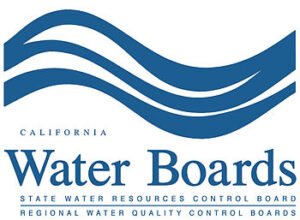
Geologist Caroline Hackett described the features of the TLS and its three stacked aquifers. The A Zone is unconfined and above the clay layer. The B Zone goes much deeper and the C Zone is below the clay layer. About 94 percent of groundwater pumped was used by agriculture contributing to overdraft of the aquifer.
Engineer with the State Board Data Unit Ben Brezing spoke about subsidence data as interpreted by DWR. He said some of the land in TLS had an uplift of elevation during the 2023 flooding. There was still subsidence taking place. Wet years slow subsidence and during dry time pumping is needed.
Hackett told the board five GSAs manage groundwater in the TLS: Mid Kings, South Fork Kings, Southwest Kings, El Rico and Tri-County GSAs submitted the GSP on time in 2020. DWR had two years to evaluate it, found it incomplete. In July 2022 a revised GSA was resubmitted. In March 2023 DWR still found it inadequate. In October 2023 a draft staff report was released and a public workshop was held in November of that year. Staff recommended probation based on GSP deficiencies in dealing with groundwater levels, subsidence and groundwater quality.
Hackett said groundwater levels as an undesirable result were not well defined and questioned the number of wells listed. She said the GSP didn’t answer how to protect domestic wells and an insufficient groundwater monitoring network was proposed. How to mitigate for impacted wells or a plan to halt the lowering of groundwater or plan for drought wasn’t adequately addressed. Staff found the minimum threshold levels to be too low to achieve sustainability. MTs are the absolute lowest level an aquifer can descend before all pumping is stopped.
Hackett said more than 700 domestic wells, almost all located around the City of Hanford are at risk. Impacts have already been noticed. Also noticed was the difficulty some online viewers had in accessing English language power point slides. Only Spanish was available for some reason. A solution was offered by the Board’s IT staff.
Subsidence, continued Hackett, was not clearly defined and what damage to infrastructure or if flooding should occur. There wasn’t enough detail on how the GSP will implement subsidence mitigation. A series of maps and charts were presented to show the possible impacts of subsidence with mitigation. Again, when surface water is available subsidence slowed.
Next Stork addressed groundwater quality. Again, the TLS GSP didn’t do a good job of defining the problem according to State Board staff. The monitoring network for the three aquifers wasn’t up to the task. Management actions and details were not acceptable to staff. A map showing domestic wells at risk for water quality was just about an overlay of the map showing groundwater level problems.
Stork reported State Board staff has held seven meetings with the GSAs to discuss concerns. She said it’s unclear if the GSAs have incorporated the staff report into a revised GSP. She then reviewed staff recommendations.
Staff Recommendations
Stork said the 2022 GSP has led staff to recommend probation. She said the plan as drafted will not achieve sustainability by 2040. Staff didn’t find a “good actor” amongst the GSAs and all of the subbasin must be included. Two GSAs requested exemption but staff didn’t think the GSP warranted this. There could in the future be a management area carved out of the subbasin to incorporate changes. Good actor is a term for one GSA in a subbasin that has developed an adequate GSP for the portion of the subbasin it controls even if the rest of the subbasin doesn’t have such success. A good actor could be exempted from probationary measures.
Wells that pump less than two acre feet per year are exempt and starting December 1st wells pumping more than two acre feet must start reporting. Record keeping starts in July. There will be a $300 per well and $20 per acre feet pumping fee imposed. This includes a 25 percent per month late fee. If a well pumps five acre feet or more it will have to have an approved meter installed.
Stork said if the Board adopts probation the GSA must continue addressing GSP deficiencies, continue implementing actions, meet with State Board staff and submit a revised GSP. The Board will evaluate the new plans. Management actions and projects must be continued.
If the deficiencies are resolved within one year staff will recommend removing probation and if not staff will develop its own GSP.
Board Response
Director Dorene D’Adamo asked staff about residual and natural subsidence. Subsidence can occur in nature without pumping. She wanted to know if staff can help the GSP revisions in this area. Brezing explained what subsidence is and I think got around to answering the question – saying they can provide modeling help.
D’Adamo asked about the reduction of fees. A staff member said under SGMA the State Board is required to collect fees. The per acre foot fee was reduced from $40 to $20 after another estimate was made. I believe the idea of charging $40 as part of a $30 million plus immediate cost was not a good picture during an election year with a governor who has further political aspirations. Staff said the goal is to charge as little as possible.
Even with the pumping fee reduced by half if the subbasin is placed in probation the immediate fine will be more than $20 million with a 25-percent per month late fee. Ouch.
D’Adamo said she wants to see local control as soon as possible should probation be implemented. She wants to avoid a doom loop where the locals continually resubmit a plan and have to rewrite it. Good for her. Stop the guessing game of how to write a plan that has never been required before.
TLS Response
A panel of representatives from the five GSAs in the subbasin spoke next at 11:10am. Geosyntec Engineer Amir Hussain spoke first. He said TLS is working on an updated GSP and is close to being able to submit it. He explained having three aquifers present particular challenges for subsidence and well levels. Most subsidence occurs in the C Zone, under the clay lens. This is where the biggest results can be achieved. There is a path to slow down subsidence by 2040 under SGMA. Interim milestones, measurable objectives and minimum thresholds are all under review and revision. Hussain reminded the board there have been improvements to subsidence in certain areas of the subbasin. He said there are areas within the subbasin that have very little infrastructure and they are debating making these areas a special zone.
Hussain said there are only a few wells in the California Aqueduct area but pumping and drilling restrictions will be heavily weighed. Mitigation programs for levees, canals and municipal wells will be implemented. Same with water quality. He reminded the board GSAs only control pumping not water quality degradation. As far as water quality can be maintained pumping will be considered. The TLS GSP will have increased monitoring and prescribed reactions before degradation occurs. They are keeping tabs through 30 new monitoring wells for: salinity, nitrates, arsenic, uranium, sulfate, chloride and 1-2-3 TCP.
maintained pumping will be considered. The TLS GSP will have increased monitoring and prescribed reactions before degradation occurs. They are keeping tabs through 30 new monitoring wells for: salinity, nitrates, arsenic, uranium, sulfate, chloride and 1-2-3 TCP.
South Fork Kings GSA
Hussain spoke for the South Fork Kings GSA as they are searching for a new General Manager and didn’t have a spokesman. South Fork has passed a 218 Election that will provide it with funds to operate. The state doesn’t pay for GSAs, the landowners within the GSA fund it. Hussain said SFKGSA is behind the other GSAs but is developing a pumping restriction plan and shallow wells and subsidence mitigation plans.
Mid-Kings River GSA
MKRGSA General Manager Dennis Mills spoke saying his GSA is uphill from Tulare Lake and has most of the population centers. Mills said there have been significant increases in the registration of wells. A pumping cap was approved last month and will be evaluated for effectiveness. The pumping restrictions are; .5 acre feet in A Zone, 3 acre feet in B Zone and 2 acre feet in C Zone.
Director Sean Maguire asked if these are being developed as, and included as, policy in the GSP. Mills said he can absolutely assure him of that. He said the local agencies understand the State Board wants the GSA to take on the expenses. A Prop 218 election is pending in the MKRGSA that will include funding for improved monitoring and mitigation as well as operations and administration costs.
Southwest Kings GSA
Jared Hutchings, GM (this is his first week on the job) said subsidence is a very small part of the SWKGSA. A well registration and mitigation program is being developed.
Tri County Water Authority
General Manager Deanna Jackson said TCWA is a joint powers authority. She said metering, demand management and domestic well mitigation were all adopted in 2020. The overall area is 117,000 acres but TC only has 10-perent of its Tulare County land in production.
Esquivel asked about the allocation policy. Jackson said the original plan was a step down every five years until 2040. In 2021 there has been a reduction in groundwater pumping. She said TC is only a small portion of the pumping taking place in the TLS. They have already collected $1.2 million in extraction fees.
Jackson told the board it is looking to lump all of the GSAs in TLS into the probation pot. She said TC has no subsidence, threatened domestic wells or other undesirable results pending after its portion of the GSP is implemented – something already underway. She said it isn’t the intent of SGMA to lump all GSAs’ behavior in harm.
El Rico GSA
Jeoff Wyrick, GM, said in 2020 there has been a metering policy in place and well registration is more than 90-percent complete. The pumping limit is two acre feet and decreasing every five years until 2040. There is a long term fallowing program – 60,000 acres during dry years. The subsidence plan includes protection of the levees surrounding Corcoran. There are no know domestic wells going dry and less than 20 domestic wells impacted due to flooding.
Wyrick concluded for the TLS saying each GSA is committed to actively managing groundwater conditions. He believes the new GSP will address the issues satisfactorily. He asked a dedicated staff member be assigned to the TLS as it takes six weeks to schedule a meeting since they have to deal with six subbasins. He asked the board to delay a decision until the updated GSP is presented.
Esquivel said not to look at probation as an either or, but as a step. He recognized the hard work and the anxiety surrounding this matter. The goal is to keep it as short as possible if enacted. Director Nicole Morgan asked about minimum thresholds. Hussain said the MTs were set so all the 4,000 or so wells are being updated. He said there are less wells and deeper than shown on the current database. The mitigation is designed to prevent pushing a problem down to a deeper zone.
Morgan asked about residual subsidence beyond 2040. Hussain said that is a big issue and understanding the process and mitigation needed is a major task. Morgan said she understands this is part of the conversation still ongoing. Hussain said there is a commitment to a subsidence study to address residual. Wyrick said El Rico GSA believes it can arrest subsidence by 2040.
Maguire said he’s looking forward to the completed plan and he complemented all the GSAs for showing up together. He said it is very meaningful to have so much representation from the TLS at the meeting in person and online.
Maguire asked about the revised GSP update. He said he’s heard a lot about public comment and outreach. He asked what process is being used for outreach.
Mills said there has been a struggle to meet today’s deadline to share as much information in the public space. The updates have been given but they are only partial. Now that the GSP is soon updated there will be more outreach. Mills added this feels like the same process that has already been taken with the DWR. Maguire said he wants to, along with D’Adamo avoid the doom loop. He said he realizes TLS is the guinea pig. He reminded the GSAs the good actor request could come later. He prefers one plan per subbasin but he also sees the challenges.
Maguire said the intent of SGMA is local control and if probation is adopted the goal is to get the subbasin back in the hands of locals and dealing with DWR.
Lower Tule River ID & Pixley ID
Jennifer Spaletta – legal counsel, Alex Peltzer – general counsel LTRID and PID and Eric Limas GM of the two districts spoke to the board. The districts are in the Tule Subbasin. Spaletta said she isn’t advocating for probation on either subbasins.
But there has been historic litigation between the two districts and Angiola Water District, a member of the Tri-County Water Agency. Spaletta said one of the reasons there isn’t much pumping in parts of the Tulare Lake Subbasin is because much of the pumping that is providing supplies is pumped and conveyed from a well field in the Tule Subbasin. She said this pumping is causing undesirable results in the Tule Subbasin.
Limas showed some maps including the 2,000 acre well field in the Tule Subbasin that is the source of groundwater for Angiola ID.
Peltzer said Tri County is producing policies for land in both the Tule and Tulare Lake Subbasins and those policies are not good for Tule. He said after the extent of the policies became known Tule asked Tri County to amend this situation. He said he doesn’t have a clear wording of how to address in a probationary declaration although he doesn’t advocate for probation. But either way he wants to the board to help resolve this situation.
Esquivel said he appreciates the situation and that is part of what has to be addressed under SGMA. D’Adamo said she appreciates the Tule folks for coming forward. Tule will get its turn pretty soon to make its presentation. She said addressing this through ongoing discussions especially at the local level is something she things the State Board should encourage.
DWR
John Yarbough is the acting deputy Director of DWR. He was online and the sound was very difficult to understand. His power point slide show indicated he was talking about subsidence on the California Aqueduct. I hate to pile on but the slides weren’t all that helpful either, lots of text and points on one slide, making it difficult to read. It looked like up to 46 percent of the capacity is at stake or has been as stake. One slide looked like a cross section of a canal bank with more dirt piled on top. I can only guess Yarbough was letting the board know DWR is aware of subsidence. As to how subsidence was impacting the Aqueduct in the TLS I haven’t a clue.
cross section of a canal bank with more dirt piled on top. I can only guess Yarbough was letting the board know DWR is aware of subsidence. As to how subsidence was impacting the Aqueduct in the TLS I haven’t a clue.
Small Farmers
Three short men walked up to the podium and stood on a chair. Wait, wrong small farmer panel. After some delay Keith and Doug Freitas and Gary Quintel were supposed to speak. Only Doug was present. He said he can see a path for adding small farmers to the ranks of the homeless. He asked Governor Gavin Newsom to remember this, peoples’ lives are at stake.
Freitas said when he was a boy working in the cotton fields he found a dead gopher. His dad told him, “See son, that gopher couldn’t make a living here either.”
He said the Water Blueprint for the San Joaquin Valley has commissioned an economic study of the implementation of SGMA without mitigation. The report prepared by UC Berkeley researchers show up to one million acres of farmland being fallowed. He said the most impacted will be the Hispanic community who depend on the agriculture driving the economic engine and they are the most vulnerable. The tax base will be massively harmed.
Freitas said storage of Kings River water could go a longways to helping meet the surface water cutbacks and recharging the area’s aquifer. There has to be surface water to clean groundwater, to prevent subsidence and the undesirable results listed under SGMA. He started to talk about Semitropic Water Storage District’s attempt to appropriate Kings River water and Esquivel, rightly so, asked him to stop since this is a separate, legal matter before the State Board.
Freitas said most of the TLS doesn’t have access to A Zone water. He said B Zone wells shouldn’t be allowed open screens in the A Zone. The small farmer can’t afford to drill to the B Zone. He said on his farm he has a 12-feet deep recharge pond that started filling up during the recent wet year.
Freitas wrapped it up by saying there are many of farmers in the TLS who don’t feel represented in this SGMA process. He said there has been some increase in the Kings River watershed and he asked the board to not place the TLS into probation. With that Esquivel thanked him and asked everyone to be back in 50-minutes.
After Lunch
As the meeting took up again there was an online native American from a tribe I didn’t hear the name of, Chumash perhaps, who urged the board to place the TLS on probation. He said farmers get their water for free and don’t pay taxes. He said farmers having to pay $20 for 1,000 acre feet and $30 per well isn’t anything. He said something to the effect that farmers have abused the earth and it is now crumbling under their feet. OK. This is the United States of America, there is free speech and we are all inaccurate now and then. Lord knows I am. But my sense is this particular bit of testimony didn’t move the needle much.
He said farmers get their water for free and don’t pay taxes. He said farmers having to pay $20 for 1,000 acre feet and $30 per well isn’t anything. He said something to the effect that farmers have abused the earth and it is now crumbling under their feet. OK. This is the United States of America, there is free speech and we are all inaccurate now and then. Lord knows I am. But my sense is this particular bit of testimony didn’t move the needle much.
Julie Freitas spoke saying she jumped into farming after marrying her husband. She said in Kings County 13.5 percent of the families live in poverty. Family farms make up 80 percent of the farms. The estimated amount of the Kings County population working directly in ag is 75 percent. Farmers are one of the most suicide plagued social subgroups – higher than veterans.
Freitas said most family farms can’t afford SGMA. She said running water down the South Fork of the Kings River will help with recharge. They are searching for a general manager in the South Forks GSA and she asked them to postpone making a probationary discission today.
Keith Freitas, no relation to the other Freitas’ testifying spoke online saying this is an unprecedented meeting. He said the state is overly focused on subsidence and asked why the state is running High Speed Rail through a Valley that’s sinking. True.
On a side note: using journalist math I’ve estimated if the station in Merced was moved two and half miles south and the Bakersfield station moved two and half miles north – the saving from shortening the track by only five miles would pay to completely refurbish the major parts of the water conveyance system in California. That’s how much a train to nowhere will cost taxpayers in a state without a balanced legislature and a press actually willing to report independently.
Freitas said the unintended consequences of SGMA are just now being scratched. He said the board should delay the probation ruling for now. He said that will be the only way to keep staff from dragging the subbasin into an inefficient abuse of power. He said farmers have been vilified in the SGMA process. Placing the financial burden of caring for disadvantaged communities on the back of small farmers is an example of unintended consequences.
After Freitas’ statement Esquivel reminded folks there is a timeline that needs to be followed. Keith Freitas did go a bit longer than his allotted time. But he did it with passion.
Bill Miguel said he’s concerned with the lower Kings River downstream from Highway 99. He said groundwater eco-dependent systems, like that in the TLS haven’t been addressed. He said the management practices of the Kings River Water Association are preventing recharge. They do this by changing the points of diversion amongst its members and he said this must be overseen by the State Board. He said there is a video “Killing the Kings River” that explains it more fully.
He said groundwater eco-dependent systems, like that in the TLS haven’t been addressed. He said the management practices of the Kings River Water Association are preventing recharge. They do this by changing the points of diversion amongst its members and he said this must be overseen by the State Board. He said there is a video “Killing the Kings River” that explains it more fully.
Josh Freitas said he’s a fourth generation farmer from Kings County. He said the current path of the GSP doesn’t permit prosperity for small farmers. He said one of the major issues is the fee structure taking out two thirds of the growers allowing for the land to be acquired by financial institutions.
Aaron Freitas, a well-represented family today, is also a fourth generation farmer and he hopes his children will be fifth generation. He’s also been a well driller and found having a three tiered aquifer is extremely rare. He said using the Kings River for recharge is a good thing.
Cody Phillips from the Coast Keepers Alliance said he believes staff “equity” analyzed the GSP and urges probation. He said, with what sounded like glee in his voice,
Nataly Escobedo Garcia of the Leadership Counsel for Justice & Accountability also urged the board to follow staff recommendations and place the TLS on probation. By the way Garcia recently received her PhD from UC Irvin. Good for her.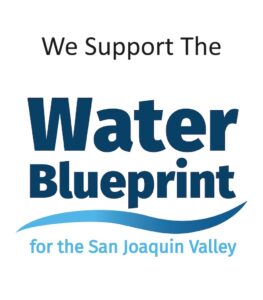
Angela Islas spoke for some (Agua-Vida?) nonprofit. She asked for probation because the staff report said there is room for water quality improvements. She also thanked staff for exempting domestic wells from SGMA.
Derreck Yurosek, chair of the Kern Subbasin Coordination Committee said they are concerned about the application of the good actor clause. He asked the State Board to provide clarification of how the good actor clause is implemented. It’s in SGMA and he said it’s not being applied here. He wants to know more about the differences between GSPs made by multiple GSAs.
Esquivel said thanks and they are trying to thread that needle. D’Adamo said there is concern if staff gets too specific it could be a problem in the future with shadow regulations. She asked any GSA with questions about this to send in comments and questions. She said don’t just send the message claiming you’re good actors, show why that is so. Yurosek thanked them.
Mac Glackin, Clean Water Action said she’ll echo earlier comments of other NGOs. Placing the TLS in probation will be a step forward for equity, climate justice and thanked staff. She said until those most impacted by climate change have their concerns addressed and measurable improvements shown there must be probation.
Alex Biering, California Farm Bureau said the relationship between the GSAs, the State Board and those living in a subbasin should be cooperative, collaborative and with the goal of true sustainability. This first look at probation should be taken with care as it is a first of its kind. Esquivel said he recognizes the anxiety.
Lynn McBride, California Dairy Campaign said she believes the adoption of probation at this time is premature. She advocates for a review of the economic impacts to family farmers and that impact on the community. Laws favoring any legitimate interest should not be prioritized in any biased manner. SGMA is an opportunity to build water resources and it needs to be managed with the input of those living and working in the subbasins. The looming threats of land fallowing should be replaced with solutions that maintain the economic well-being of those living in the area.
Tom Pires, a farmer on the south fork of the Kings River said he’s sat through GSA meetings and he’s heard over and over – advocates for – getting more surface water to the area. He asked the board to put themselves in the place of those who live there. Esquivel said last year 1.2 million acre feet of additional water was approved for recharge. The State Board did have a good roll to play in that. He said the Board is looking at recharge as well as demand reduction.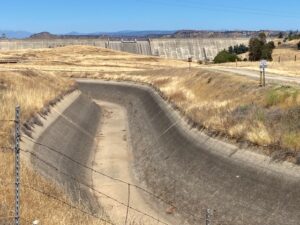
Westly Harmon, Big River Drilling said he’s drilled many wells in the Valley and knows the geology as well as any engineer. He said a domestic well is six inch shaft or less. He works with Self Help Enterprises and they won’t fund a shallow well because with less than two weeks of recharge they are full again. He said shallow water often, naturally has poor water quality.
Rachel Glauser, Delta View Water Association said there are irreversible consequences of placing the TLS in probation. She said most of the concerns have been about having enough time to adapt. She asked the Board to give the area more time to fix the plan and leave it to the folks who live there.
Joaquin Contente, dairy farmer in Kings County said his family moving from the Azores to California was the best thing that could have happened to them. He said there must be a better solution than blocking landowners from pumping their supplies. He suggested looking back for future examples. He said Pine Flat Dam was undersized by half a million acre feet and four administrations have failed to get a peripheral canal or some other Delta conveyance implemented.
Jacqueline Lowe, started by saying thanks for listening for six hours already. Her family has been farming in the Valley since 1882. She said the water situation has long been ignored and the GSA can only bring draconian measures to bear. She said she fully supports correcting the water problem but not the way the Mid Kings GSA is going about it. She said there was very little stakeholder input in the GSP development. She thought it unfair to charge the same fee for big/corporate farms and smaller farms due to economy of scale.
Blake Wilbur, farmer and Tulare ID board member. He said he volunteered for the Mid Kaweah GSA Stakeholder Committee. He said the farmers in the Tulare Lake Subbasin are in a tough position as are the farmers in the Kaweah Subbasin. He said they are implementing some of the harshest allocations ever seen in the area. The subbasin is already working on the 2025 allocation so it doesn’t take anyone by surprise. He said he’s proud last year was a record breaker for recharge. He said they are building basins in disadvantaged communities. He said the rubber is meeting the road. There are good actors out there. He urged the board to consider the action already undertaken when considering probation rulings.
Aaron Fukuda, GM Tulare ID said this is the 10-year anniversary of SGMA. He said what is being seen on the ground are impacts to water pricing and land values. He said making a decision on one side will impact the other. He said the metering issue in the draft staff report is difficult when they are already using the evapotranspiration model. He asked to consider ET as an option to metering.
Emmanuel Cortes, crop consultant with territory in the Valley. He said he’s not an expert on water but he has yet to hear a good word about SGMA. He and his wife recently purchased 13 acres in Lemoore but was denied by the local GSA to drill a well. He said there is no way SGMA can be equable if it allows blocking farmers from farming even before they start.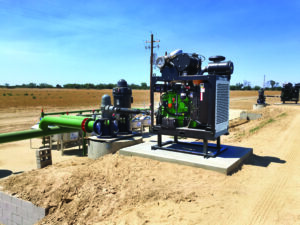
Dusty Ference, GM Kings County Farm Bureau said probation of the TLS is a train wreck riding over the cliff. He said he wants the Board to provide Kings County Farm Bureau the justification for the fine rates arrived. He asked if the State Board has a plan to protect the local economy. He said staff doesn’t appear to want to do so. Ference asked the Board to provide the names of the staff and consultants who have developed a plan. He asked how can the plans developed by the locals always be wrong and the staff correct? Esquivel said to keep in mind the GSP was reviewed first by DWR before the staff and there is a consistency there. He didn’t rebut other comments in this manner but did promise to provide the requested materials.
Julie Margaret Martella, small farmer in Kings County supported Ference’s statements and asked how small farmers and the community can survive. She said she supports SGMA and wants it to succeed but not at the cost of destroying an entire region. She said allow for additional time to assess the impacts of probation.
Helen Sullivan, Kings County farmer said she supports Ference’s comments. She said the decision to place the Tulare Lake Subbasin on probation will harm more than farmers, it will harm all who depend on ag. She asked for 120 day delay to enable concerned parties to work collectively to a sustainable solution. SGMA allows for two five year extensions and that just shows how the legislation was meant to be incrementally implemented.
Soren Nelson, ACWA said this hearing is a microcosm of the SGMA process, long and somewhat uncomfortable. He said a year ago how a subbasin could get out of probation and how much in fees wasn’t known. Now it is. He said all the basins are now covered by GSAs and GSPs and that wasn’t expected when the law was written. Many of these GSAs are not well resourced and that should be taken seriously into consideration. He said it is evident the GSAs are working hard and fast to get in compliance.
Brian Maderas, Valley farmer who said farmers sweat and bleed everyday to grow food. He said when they don’t irrigate around his home they see problems with their domestic wells. Farmers use domestic wells also. Then he quoted one of my reports, good for him and thanks. He continued saying probation could put the local economy in shambles. He wants to pass his farm down to his son.
Marihart spoke again saying he farms and has ag related businesses. He said the country is in poor shape due to inflation and other current conditions. He said the regulatory reach will have a profound impact on banking, food supply and national matters. Probation will only put the small family farm out of business and the corporate farms who the environmentalists love to hate will be taking more and more of a share of the food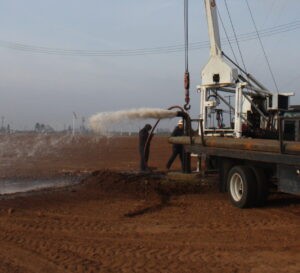 production. He said it is evident in the dairy business. He said he grew up swimming in the South Fork of the Kings River and environmental diversions to the ocean have stopped that. The riparian habitat along the river is being harmed. Probation will exacerbate this.
production. He said it is evident in the dairy business. He said he grew up swimming in the South Fork of the Kings River and environmental diversions to the ocean have stopped that. The riparian habitat along the river is being harmed. Probation will exacerbate this.
Tien Tran, Community Water Center said many NGOs submitted a comment to place the TLS in probation. The people most impacted by the decision aren’t here today because of the resources it takes to attend a hearing in Sacramento is beyond most NGO ability as they are home taking care of their families. She said outreach to disadvantaged communities has been very poor by the GSAs.
Forgive me if I’m wrong but CWC and other NGOs like it have received millions in taxpayer Prop One grants to do outreach. Check with the California auditor. Other people with families to care for, like farmers and merchants who depend on the farm economy weren’t able to attend either. But some of them did participate even though they didn’t have an nonprofit organization paid by public funds to conduct outreach. It’s an insult of soft racism to claim someone can’t attend a meeting. Like Esquivel, I didn’t comment on everyone’s testimony. But when an organization takes public money to do a job then blames others for not getting the job done – it merits comment.
Akashdeep Singh, speaking for some wildlife NGO I believe, urged probation. It was very difficult to understand her. The connection wasn’t all it could be.
Jasmine Ramirez, Self Help Enterprises said increased sampling of water quality should be conducted. She asked for seats for DACs and tribes be included on stakeholder committees. She said, “In closing, we value the state water board as a partner in SGMA implementation and drought mitigation efforts, and we are confident that moving forward, both the State Water Board and groundwater sustainability agencies will work diligently to fulfill their responsibility to guarantee the proper protection of drinking water.”
George Kostyrko, former State Board employee said to be balanced and to use pressure as needed.
Dino Giacomazzi, fourth and fifth generation farmer Delta View Water Association said a land fallowing program is in a pilot phase that can help achieve sustainability quicker and for less costs. Much of this happens outside the confines of GSAs. He said the Mid Kings GSA’s GM Dennis Mills has two jobs and he has made incredible progress beyond what could be expected. Giacomazzi said Mills has had to do this with a minimum amount of guidance from State Board staff. He asked if there is probation how will the State Board include outreach and transparency. Esquivel said transparency is a value he and the Board hold.
Johnny Gailey, Delta View said much of his points have been covered. He said he believes the plan is almost ready. He said if the Board could provide facilitations dedicated to TLS that would be tremendously helpful. Gailey said more than $9 million in annual pumping fees is expected to be fined on probation adoption. How much does the Board need is a major question.
Brian Dezerea, attorney for Angiola ID and alumni of Lemoore High School said he appreciates the Board and staff efforts. He said he was a bit taken back that Lower Tule River and Pixley ID took time to discuss a Tule Subbasin issue during a TLS hearing. He said he wanted to provide more information on the situation. He reminded the Board the 2013 agreement on this issue has been completely complied with by Angiola ID.
Garrett Gilcreast said his family has been farming in the Lemoore area for more than 100-years. What he didn’t hear today were the impacts on ag workers. He said conditions for ag workers have changed for the better and he doesn’t want to see the disadvantaged communities become more disadvantaged. That will require more communication. He said an acceptable GSP is close and with or without probation, communication with the Board is ever more important.
Lauren Evangelo, Kings County dairywoman said she’s concerned about the food supply in the macro but also in the local area as paychecks are going to shrink. She said ag imports to California in 2020 were $10 billion, while at the same time exports were $13 billion. This is crazy when it is considered the San Joaquin Valley is the leading ag area on earth. Climate change will be made worse when you consider the farming practices elsewhere that would be replacing California’s safe and efficient growers. She said the best time to plant a tree is 20-years ago. The second best is now.
Steve Jackson, farmer and former Tri County board member said there has been a great movement in stakeholder involvement, especially on the south fork. People have to interact. He said he senses the Board wants local control. There have been issues with DACs due to a lack of water supplies. Demand management isn’t the silver bullet. Subsidence’s impacts spread far beyond just TLS.
David Stanfield, farmer from Hanford said he’s been following this process closely and sees the GSP almost ready and staff said it will take three months for a review. He asked for a delay in adopting probation.
Josh Bettencourt, Kings County farmer said the decision today will impact his family and countless others who rely on agriculture for their livelihood. He trusts the Board will take this into account. He endorsed the written comments of several that point out SGMA wasn’t to impact common groundwater rights. That hasn’t been addressed in the probation discussion. The cost to install meters on wells is in the thousands of dollars and unaffordable in one swoop. He urged the board to delay a probation ruling.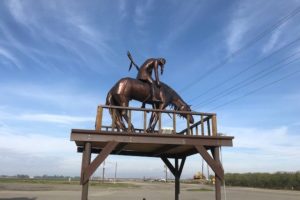
That was the last public comment of the day and occurred at 5:22pm. By then the chairs in the hearing room felt like medieval torture devices.
Esquivel thanked everyone for their patience. He told us he comes from the Coachella Valley from a farm worker family. He realizes probation can be viewed as punishment or worse but it is only a step towards a different partnership, even if that sounds Pollyannish of him, an opportunity. He then turned the meeting over to the next part; where the board gets to weigh all of the information that was received today.
Board Response
D’Adamo said she likes the idea of having dedicated staff for the TLS. She also saw a need for additional flexibility between ET and meters. Esquivel echoed the need for a dedicated staff member.
Morgan said this won’t be an easy decision – very complex. She said for her this will be about finding the balance. She had some questions about minimum and maximum thresholds. She asked if the last 10-percent of finishing the plan is really 10-percent. She’d like to see a closer estimation about how many wells will go dry. She said the goal is local control as quickly as possible and wants an efficient use of time. She is open to taking advantage of new technology.
Director Laurel Firestone said it’s been a long day and much to process. She said she recognizes putting together a sustainable plan is difficult. She said not just farmers’ profits but families as well – the entire community will be impacted at this turning point. She said this is it – reducing pumping will have impacts but so will doing nothing. She said this is the new climate and there isn’t choice. She also said the folks in the region are best at managing the subbasin, but it is also time for the state to step in. She said probation is the first step*.
Firestone was encouraged by what the GSAs have accomplished. She likes the well registration. It seems to her a vital step. She’s also happy about the well mitigation program designed to prevent dry holes and poor water quality. She said developing a well mitigation program is a specialty in itself. She said they’ve been working with Self Help Enterprises on this. She said there will continue to be impacts and she wants to see folks get safe water right away. She wants more community and small farmer engagement. She said there is an annual review of fees of all programs at the State Board and would like to look into reducing fees for small farmers. She said she does think there needs to be probation. She wants to focus on supplies and not just demand reduction. Although she said earlier if the subbasin can’t get out of probation and staff takes over there will be a great deal of demand reduction – severely reduced pumping allocations.
Esquivel said there needs to be an acknowledgment smaller farms need special consideration.
Maguire began by thanking everyone for sharing today. He said he doesn’t have all the answers or solutions and looks as this is a space to find them together. This is the 10-year anniversary of SGMA, an adaptive management exercise. He said the lack of data when this started was huge and we’ve learned so much in such as short time. He said don’t let perfect be the enemy of good. The staff report is a sample set of actions. He said he thinks it’s time to move forward. He asked about the potential actions and doesn’t want to see demand management be the only tool in the box. How does the GSAs stay the face of SGMA instead of the State Board, was one of his questions.
Staff Response
James Nachbaur said having a dedicated staff would be a good improvement. He turned it over to Stork who said she had slides. The new State Board Executive Director Eric Oppenheimer said he doesn’t believe slides are necessary. If the board is interested to allow ET that can be included in the probationary plan. Firestone was against using ET. She kept referring to Open ET which has not been as widely accepted as Land IQ’s satellite ET system. Land IQ is already widely in use.
D’Adamo and Morgan said having an ET option is good for some small growers. Firestone said she thinks this will be confusing but she’s up for finding the best way to signal the Board is open to good water management. She just doesn’t want the perception the Board will do this for all subbasins that go into probation.
Stork spoke about subsidence saying having all three aquifer zones set at the 2015 water levels needs to be adjusted and they don’t have a minimum threshold figure at this point. She said she looks forward to hearing more from the GSAs. Hackett said she’s heard good news from the GSAs in this area today.
Amanda Pearson said sustainable yields means there are no undesirable results. There is nothing in the current GSP that shows this in any of the GSAs. That means staff doesn’t see any good actor awards this Oscar season. However, she too is interested in seeing the new GSP and the possibility of management zones.
Maguire asked if a clarification on water supply actions can be a part of the plan and not just demand management. He said he’d be open to a plan with both. Sarah Sugar responded by saying there needs to be an idea of feasibility of securing water supplies in a GSP. That is an iffy deal it seems. If they could get more surface supplies in an easy manner it would have happened. But it is vital to continue the search.
Stork said there is an online system called GEARS, don’t know what that stands for but it is going to help navigate the State Board’s page, perhaps. I wasn’t sure what she was referring to.
Pearson said she didn’t invent it but there is a new proposal so that if someone without meters would have a less expensive option. The proposed language was read into the minutes and it sounds like all things provided ET could be used for reporting. Of course, if you already have a meter you have to use it.
The Vote
Esquivel said it looks like time to vote. D’Adamo said there were many requests for a delay at today’s hearing. But the Board did not receive any document that stated that. She said she wouldn’t be comfortable with a delay absent that request fleshed out with a written request explaining why. She added she has hope because she sees improvements. She said there are many other agencies and the legislature who have much more to do with securing surface supplies. So, after that she moved and it was seconded to place the Tulare Lake Subbasin in probation. The Board voted unanimously for probation at 6:35pm. And that was that.
DISCLAIMER OF RESPONSIBILITY; Waterwrights.net strives to provide its clients with the most complete, up-to-date, and accurate information available. Nevertheless, Waterwrights.net does not serve as a guarantor of the accuracy or completeness of the information provided, and specifically disclaims any and all responsibility for information that is not accurate, up-to-date, or complete. Waterwrights.net’s clients therefore rely on the accuracy, completeness and timeliness of information from Waterwrights.net entirely at their own risk. The opinions expressed in this report are those of the author and do not represent any advertisers or third parties.
*Tipped her hand on how she was voting. It sounded a little like she was looking to state takeover after one year as the next step. I hope she meant turning the subbasin back to local control as the second step. (SGMA could be viewed as the first step by the state.)
ALL RIGHTS RESERVED. Copyright 2024 by WaterWrights.net
































